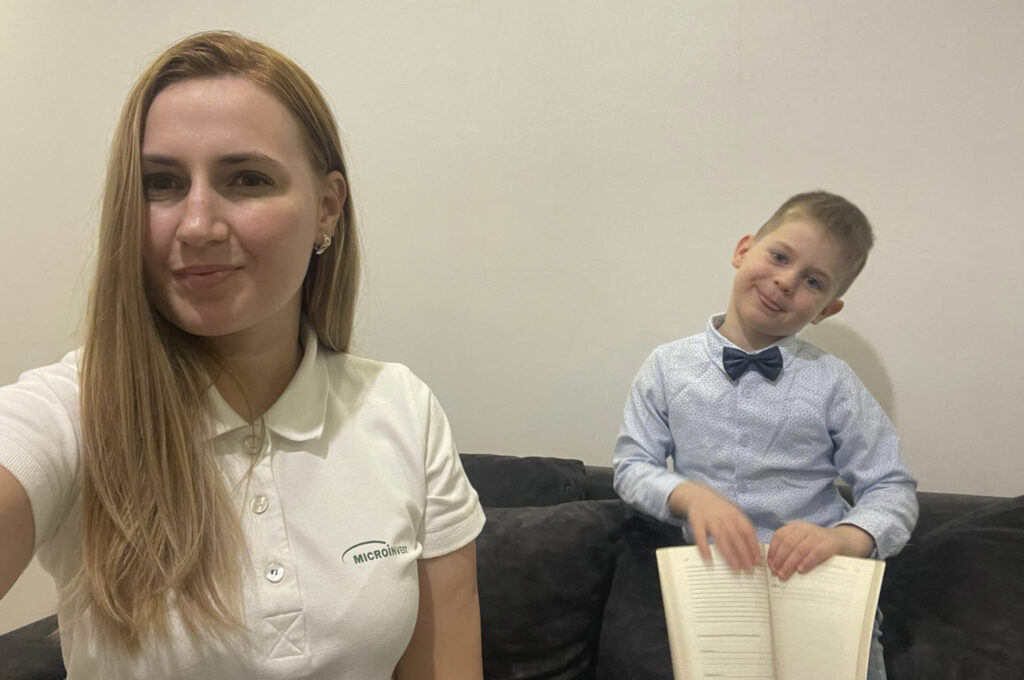Do you remember when we were kids, we used to play “at the store” with our friends from kindergarten? We built an improvised kiosk where we sold things we found in the yard and paid for them with “precious” banknotes made from walnut, apple, or cherry leaves. We were very careful and saved every “freshly picked” banknote. Those were the first lessons in financial education that taught us that money has value and doesn’t actually grow on trees. Today, children’s games have evolved but financial education remained as relevant today, albeit more difficult for young parents to explain.
At Microinvest we treat both the lending process and the financial education of the younger generation responsibly. Because we know that an informed child grows up to be a responsible adult. Colleagues from our team are the first advocates for financial education in their families and tell their children from an early age about money, credit, and the family budget. Especially during the Financial Education Week, in which we participate annually.
If you’re a young mom or young dad and feel it’s time to talk to your kids about money and family expenses, learn some helpful tips from our colleagues that will make this conversation more interesting and efficient.
“We talk about money, budget, and credit through interactive games.”

Despite they are small, children are well aware of everything that happens around them. Even psychologists advise to be as open as possible and not to make up stories. Children need to know that money does not “fall from the sky,” that it is impossible to buy everything they want, and that you need to save money and properly manage your budget so that there will be enough for all expenses. In the family of Irina, our colleague from HR Department, such discussions are a common thing. Both parents work in the financial sector, so Ksenia and her younger sister Sofia knew about money and even loans from an early age.
We talk openly with our daughters about everything. The last conversation was about loans, and we organized it in the form of a game. The rules were simple, Ksenia needed eight grains of popcorn to buy the remote control from her father. Every 30 seconds she would get 2, one to eat and one to keep. The movie had already started but Ksenia had only 4 grains of popcorn. Therefore, Dad suggested that Ksenia would take a loan, she would receive 4 grains of popcorn and would be able to enjoy her favorite movie, and after that, she would have to return 5. So said, so done, Ksenia achieved her goal, and on top of that, she learned what a loan, interest, and credit terms mean.
“In our family, all decisions are taken together, including on the budget management.”

The tradition of having a piggy bank for savings still runs in the family of Laura, a Loan Officer at Microinvest. The owner of the piggy bank is her son Damian, who is only 5 years old. He always thoroughly counts the money stored in their family mini-safe. Damian knows that his mom and dad work every day to get paid, and by managing their money properly, they can buy everything they need. Moreover, he responsibly manages the money he receives from his grandparents and godparents to fulfill his dream of going to Disneyland with his mom and dad. Little but with big dreams.
Talking about money with Damian is natural and simple. We go to the store together, count the money we put in the piggy bank and calculate how much money we need to buy something special for the house. He always asks us unusual and even uncomfortable questions. And the most interesting thing is that he has his own answers to everything. The funniest case was some time ago, when the teacher asked him what his mom does at work, and he said that mom makes people happy. She grants them loans so they can pursue their dreams. We talk to him like an adult, because we think that this way we raise a responsible and resourceful person.
“We have a preassigned weekly budget that everyone spends as deemed necessary.”

Olesea, head of the HR department, is convinced that financial education begins with pocket money. Her son Cristian, 10 years old, already manages his own weekly budget, has his own savings, and dreams of becoming an entrepreneur so he can develop a successful business. Their family’s favorite game is Monopoly, a good example of financial education.
Every parent knows better how to talk to their children about the world around them, including money. It is important that these conversations begin as early as possible and be simple and straightforward. Since childhood, Cristian tried to be independent in all his actions, managed his pocket money and put the money he received as a gift into his piggy bank. Now when he goes to school, he has more savings and more serious plans for investing them. I really like his interest in everything, as well as the initiative to be independent. Budgeting patterns are different in every family, it’s important to convey the main message to children: invest your money correctly and responsibly.
We hope our colleagues’ recommendations for children’s financial education will be helpful to you. This week, we’ll share other interactive information about money, budgeting, and credit for kids and teens in #GMW2022. Follow our website and social media pages and participate in the financial education of the younger generation. Because informed children will grow up to be responsible adults.










